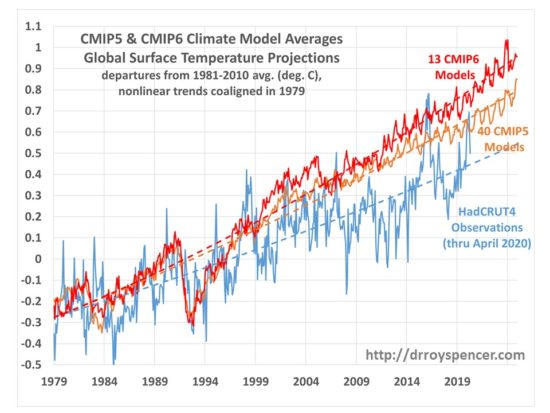Those who defend climate model predictions often produce plots of observed surface temperature compared to the models which show very good agreement. Setting aside the debate over the continuing adjustments to the surface temperature record which produce ever-increasing warming trends, let’s look at how the most recent (CMIP6) models are doing compared to the latest version of the observations (however good those are).
First, I’d like to explain how some authors get such good agreement between the models and observations. Here are the two “techniques” they use that most annoy me.
- They look at long periods of time, say the last 100+ years. This improves the apparent agreement because most of that period was before there was substantial forcing of the climate system by increasing CO2.
- They plot anomalies about a common reference period, but do not show trend lines. Or, if they show trends lines, they do not start them at the same point at the beginning of the record. When you do this, the discrepancy between models and observations is split in half, with the discrepancy in the latter half of the record having the opposite sign of the discrepancy in the early part of the record. They say, “See? The observed temperatures in the last few decades nearly match the models!”
In the following plot (which will be included in a report I am doing for the Global Warming Policy Foundation) I avoid both of those problems. During the period of strongest greenhouse gas forcing (since 1979), the latest CMIP6 models reveal 50% more net surface warming from 1979 up to April 2020 (+1.08 deg. C) than do the observations (+0.72 deg. C).
Note I have accounted for the trends being somewhat nonlinear, using a 2nd order polynomial fit to all three time series. Next, I have adjusted the CMIP time series vertically so that their polynomial fit lines are coaligned with the observations in 1979. I believe this is the most honest and meaningful way to intercompare the warming trends in different datasets.
As others have noted, it appears the CMIP6 models are producing even more warming than the CMIP5 models did… although the KNMI Climate Explorer website (from which all of the data was downloaded) has only 13 models archived so far.

 Home/Blog
Home/Blog




